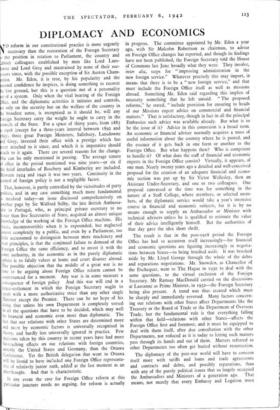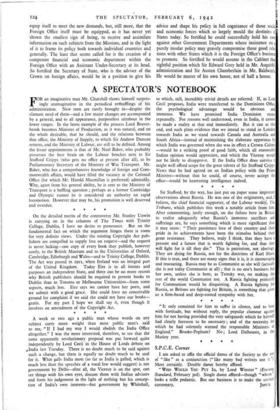DIPLOMACY AND ECONOMICS
0 reform in our constitutional practice is more urgently necessary than the restoration of the Foreign Secretary the position in relation to Parliament, the country and binet colleagues established by men like Lord Lans- owne and Lord Grey and maintained by none of their suc- essors since, with the possible exception of Sir Austen Cham- rlain. Mr. Eden, it is true, by his popularity and the rsonal confidence he inspires, is doing something to recover e lost ground, but this is a question not of a personality ut of a system. Only when the vital bearing of the Foreign ► thee, and the diplomatic activities it initiates and controls, of only on the security but on the welfare of the country in e broadest sense, is recognised. as it should be, will any oreign Secretary carry the weight he ought to carry in the ounsds of the State. For a space of thirty years, from 1885 1916 (except for a three-years interval between 1892 and 895), three great Foreign Ministers, Salisbury, Lansdowne nd Grey, invested their office with a prestige which has ever attached to it since, .and which it is imperative should ttach to it again. There are several reasons for the change.
one can be only mentioned in passing. The average tenure if office in the period mentioned was nine years—far six if e brief interludes of Rosebery and Kimberley are included. etween 1924 and 194o it was two years. Continuity in the ontrol of foreign policy is not a negligible factor.
That, however, is partly controlled by the vicissitudes of party olitics, and in any case something much more fundamental s involved today—an issue discussed comprehensively on mother page by Sir Walford Selby, the late British Ambassa- or to Portugal, who, as principal private secretary to no ewer than five Secretaries of State, acquired an almost unique -nowledge of the working of the. Foreign Office machine. His esis, incontrovertible when it is expounded, but neglected little completely by a public, and even by a Parliament, too little accustomed to distinguish between mere machinery and vial principles, is that the consinued failure to demand of the Foreign Office the same efficiency, and to invest it with the same authority, in the economic as in the purely diplomatic sphere is to falsify values at home and court disaster abroad. The possible objection that the middle of a great war is no time to be arguing about Foreign Office reform cannot be countenanced for a moment. Any war is in some measure a consequence of foreign policy And this war will end in a peace-settlement in which the Foreign Secretary ought to speak with a more authoritative voice than any other single Minister except the Premier. There can be no hope of his doing that unless his own Department is completely versed in all the questions that have to be decided, which may well be financial and economic even more than diplomatic. The fact that our relations with other States are determined more and mere by economic factors is universally recognised in theory, and hardly less universally ignored in practice. Few decisions taken by this country in recent years have had more far-reaching effects on out relations with foreign countries, notably the United States and Germany, than the Ottawa Conference. Yet the British delegation that went to Ottawa Will be fourid to have included one Foreign Office representa- tive of relatively junior rank, added at the last moment as an afterthought. And that is chaiacteristic.
In any event the case for Foreign Office reform at this particular juncture needs no arguing, for reform is actually in progress. The committee appointed by Mr. Eden a year ago, with Sir Malcolm Robertson as chairman, to advise on Foreign Office changes has reported, and though its findings have not been published, the Foreign Secretary told the House of Commons last June broadly what they were. They involve, inter alia, steps for " improving administration in the new foreign service." Whatever precisely this may import, it means that there is to be a " new foreign service," and that must include the Foreign Office itself as well as missions abroad. Something Mr. Eden said regarding this implies of necessity something that he left unsaid. " The proposed reforms," he stated, " include provision for ensuring to heads of our Missions expert advice on commercial and financial matters." That is satisfactory, though in fact in all the principal Embassies such advice was available already. But what is to be the issue of it? Advice in this connexion is a broad term. An economic or financial adviser normally acquires a mass of useful information about the country where he is posted, and the essence of it gets back in one form or another to the Foreign Office. But what happens then? Who is competent to handle it? Of what does the staff of financial and economic experts in the Foreign Office consist? Virtually, it appears, of one man. Nearly twenty years ago a detailed and well-conceived proposal for the creation of an adequate financial and econo- mic section was put up by Sir Victor Wellesley, then an Agsistant Under-Secretary, and one or two colleagues. One proposal canvassed at the time was, for something in the nature of a Staff College, where members, or selected mem- bers, of the diplomatic service would take a year's intensive course in financial and economic subjects, for it is by no means enough to supply an Ambassador or Minister with technical advisers unless he is qualified to estimate the value of their advice intelligently himself. But the authorities of that day gave the idea short shrift.
The result is that in the post-1918 period the Foreign Office has had to accustom itself increasingly—for financial and economic questions are figuring increasingly in negotia- tions between States—to being brushed aside. It was brushed aside by Mr. Lloyd George through the whole of the debts and reparations negotiations. Mr. Snowden, as Chancellor of the Exchequer, went to The Hague in 193o to deal with the same questions, to the virtual exclusion of the Foreign Secretary. Mr Ramsay MacDonald carried on the discussions at Lausanne as Prime Minister, in 1932—the Foreign Secretary being also present. A trend was thus created which must be sharply and immediately reversed. Many factors concern- ing our relations with other States affect Departments like the Treasury or the Board of Trade or the Department of Overseas Trade, but the fundamental rule is that everything falling within that field—relations. with other States—affects the Foreign Office first and foremost, and it must be equipped to deal with them itself, after due consultation with the other Departments, not reduced as it is today to letting such matters pass through its hands and out of them. Matters referred to other Departments too often get buried without resurrection.
The diplomacy of the post-war world will have to concern itself more with tariffs and loans and trade agreements and contracts and debts, and possibly reparations, than with any of the purely political issues that so largely occupied the Ambassadors and Ministers of a generation ago. That means, not merely that every Embassy and Legation must equip itself to meet the new demands, but, still more, that the Foreign Office itself must be equipped, as it has never yet shown the smallest sign of being, to receive and assimilate information on such subjects from the Missions, and in the light of it to frame its policy both towards individual countries and generally. The least that seems called for is the creation of a competent financial and 'economic department within the Foreign Office with an Assistant Under-Secretary at its head. So fortified the Secretary of State, who is the adviser of the Crown on foreign affairs, would be in a position to give his advice and shape his policy in full cognizance of those social and economic forces which so largely mould the destinies of States today. So fortified he could successfully hold his own against other Government Departments whose insistence on a purely insular policy may gravely compromise those good rela- tions with other States which it is the Foreign Office's business to promote. So fortified he would assume in the Cabinet that rightful position which Sir Edward Grey held in Mr. Asquith's administration and Sir Austen Chamberlain in Mr. Baldwin's, He would be master of his own house, not of half a house.



























 Previous page
Previous page